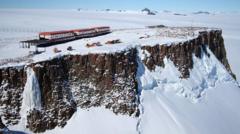Scientists stationed at the Sanae IV base in Antarctica are facing a crisis following the alleged assault of a team member. Typically, around ten researchers collaborate at this South African-run base, which is positioned approximately 170 kilometers (105 miles) from the nearest ice shelf and is notoriously challenging to access.
A spokesperson for the South African government confirmed that "there was an assault" at the research station, relating to earlier concerns of inappropriate behavior amongst team members. The South African environment ministry emphasized that they are addressing the situation with "utmost urgency." Reports indicate that team members have urgently petitioned for a rescue amidst the turmoil.
The environment ministry stated that every team member had successfully passed a series of thorough evaluations, including background checks and medical assessments before their assignment to Antarctica. The Sanae IV station, located over 4,000 kilometers from mainland South Africa, sees extended periods of isolation due to extreme weather conditions that can impede access throughout much of the year. Since 1959, South Africa has conducted research expeditions in this challenging environment.
In a shocking revelation, the Sunday Times of South Africa reported that a team member raised alarms in an email about "deeply disturbing behavior" exhibited by a colleague. Further details from a government spokesperson highlighted that the alleged assault stemmed from a conflict related to a specific task that required a schedule adjustment based on weather conditions.
While incidents in Antarctica are rare, they are not unheard of. In 2018, a reported stabbing occurred at the Russian-operated Bellingshausen research station. Experts have noted that isolation can significantly impact human behavior, often leading to escalated conflicts over seemingly minor issues. Craig Jackson, a professor of workplace health psychology at Birmingham City University, remarked on how small disagreements regarding hierarchy, task distribution, or even leisure time can unexpectedly spiral into larger confrontations in isolated settings.
For ongoing updates and insights into environmental developments, consider subscribing to the Future Earth newsletter, delivered weekly by the BBC's Climate Editor, Justin Rowlatt.
A spokesperson for the South African government confirmed that "there was an assault" at the research station, relating to earlier concerns of inappropriate behavior amongst team members. The South African environment ministry emphasized that they are addressing the situation with "utmost urgency." Reports indicate that team members have urgently petitioned for a rescue amidst the turmoil.
The environment ministry stated that every team member had successfully passed a series of thorough evaluations, including background checks and medical assessments before their assignment to Antarctica. The Sanae IV station, located over 4,000 kilometers from mainland South Africa, sees extended periods of isolation due to extreme weather conditions that can impede access throughout much of the year. Since 1959, South Africa has conducted research expeditions in this challenging environment.
In a shocking revelation, the Sunday Times of South Africa reported that a team member raised alarms in an email about "deeply disturbing behavior" exhibited by a colleague. Further details from a government spokesperson highlighted that the alleged assault stemmed from a conflict related to a specific task that required a schedule adjustment based on weather conditions.
While incidents in Antarctica are rare, they are not unheard of. In 2018, a reported stabbing occurred at the Russian-operated Bellingshausen research station. Experts have noted that isolation can significantly impact human behavior, often leading to escalated conflicts over seemingly minor issues. Craig Jackson, a professor of workplace health psychology at Birmingham City University, remarked on how small disagreements regarding hierarchy, task distribution, or even leisure time can unexpectedly spiral into larger confrontations in isolated settings.
For ongoing updates and insights into environmental developments, consider subscribing to the Future Earth newsletter, delivered weekly by the BBC's Climate Editor, Justin Rowlatt.




















